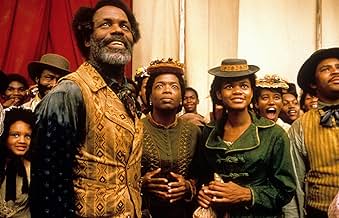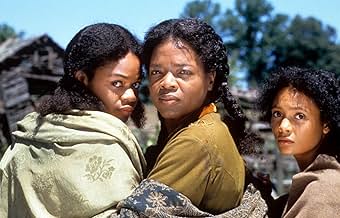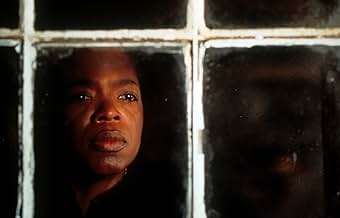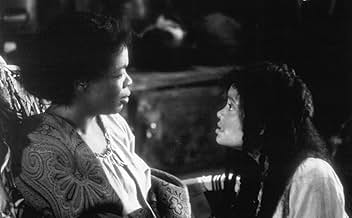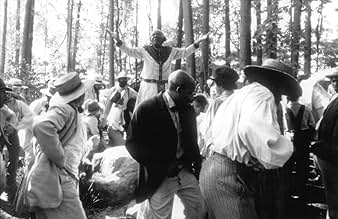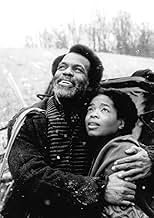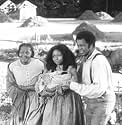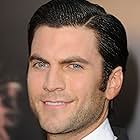IMDb RATING
6.1/10
9.8K
YOUR RATING
A slave is visited by the spirit of a mysterious young woman.A slave is visited by the spirit of a mysterious young woman.A slave is visited by the spirit of a mysterious young woman.
- Nominated for 1 Oscar
- 3 wins & 24 nominations total
Kessia Embry
- Amy Denver
- (as Kessia Kordelle)
LisaGay Hamilton
- Younger Sethe
- (as Lisa Gay Hamilton)
Thandiwe Newton
- Beloved
- (as Thandie Newton)
Featured reviews
I read Beloved in an intro English course and it took me a long while to get used to Toni Morrison's writing style. She once said in an interview that she wrote the book to be disorienting, in some ways to re-enact the feeling of the slave diaspora.
I thought the book heart-wrenching, at times gut-wrenching, and vivid. The character of Paul D never made much sense, seeming like a man waiting for something to happen, but Sethe burned off the page. What I remember most is Baby Suggs' speech at the rock, which the film has divided into three segments.
I projected Beloved for the college theater and I have to say it was long and arduous, especially if you haven't read the novel. There is no SENSE to the PAIN that goes on with these characters; in Braveheart and Titanic, we have a certain tragic pleasure in mass death or torture that we can't receive from Beloved. I read a lot of comments talking about the ghost in Beloved, but the ghost is more of a catalyst for looking into the characters than the star of the film.
I admired the time put in most. It just seemed like Demme and Tak Fujimoto, and the lighting designer as well, gave the actors the time they needed to act and sink into things: unlike traditional MTV-editing, some scenes were comprised of only one shot, usually tracking, as Paul D and Sethe in the cornfield. The score was brilliant; Portman really found a grace in stillness and the trembling African voice and the flute. It was bare but riveting at the same time.
People have said that the film went for too much shock value. That's possible- did we need the close-up of the dead child at the breast? No. But then again when we read it in the book, don't we think of it? Don't we for a split second see that image in our heads? I for one thought of much more graphic things when Morrison discussed Paul D and Beloved's night in the shed. The camera and the actors treat the world of Beloved and the audience with respect. Winfrey does seem more like someone who loves Sethe's character, than Sethe herself, but she did it for me. The sadness, the strength, emptiness, she did it, and Lisa Gay Hamilton as the young Sethe was riveting with her time in the film. The look in her eyes when Schoolteacher says "Animal" is amazing.
Danny Glover always does a good job, but he didn't really amaze me. For me, you know what you're getting with Glover, nice guy, troubled soul, easy-going with fits of rage every now and then. It's what he likes to play, and he does it well here but no surprises. The surprises are Winfrey, and Kimberly Elise especially in those crucial minutes when she decides to leave home, the fear and determination on her face. (She somehow becomes more sexual by the end of the film when she sees Paul D.) Thandie Newton is incredibly freaky and disgusting as Beloved with the exception of that ONE long gaze she gives Danny Glover that night, seduction, perfect symmetry. And Beah Richards as Baby Suggs: I wanted her to be my mother. She broke my heart with her religion: "This is the prize. This is the prize." The preaching scenes are INCREDIBLE in this film, especially since Tak Fujimoto chooses a circular tracking shot that allows them to do it all at once.
There isn't much redemption at the end. Sethe is drained and miserable. Paul D is on his own but still not totally free. I think Roger Ebert's comment put it best: the happy ending of Beloved is that the ordeal is OVER. There is no sense to the pain, but one hopes at the end that there can be healing.
I loved this film. I loved the fact that it's not hammering any one message home, but you can take things about motherhood, race, brutality, the dangers of love and commitment, freedom, and chains out with you: it's all there. And it is as beautiful as it is wrenching.
I thought the book heart-wrenching, at times gut-wrenching, and vivid. The character of Paul D never made much sense, seeming like a man waiting for something to happen, but Sethe burned off the page. What I remember most is Baby Suggs' speech at the rock, which the film has divided into three segments.
I projected Beloved for the college theater and I have to say it was long and arduous, especially if you haven't read the novel. There is no SENSE to the PAIN that goes on with these characters; in Braveheart and Titanic, we have a certain tragic pleasure in mass death or torture that we can't receive from Beloved. I read a lot of comments talking about the ghost in Beloved, but the ghost is more of a catalyst for looking into the characters than the star of the film.
I admired the time put in most. It just seemed like Demme and Tak Fujimoto, and the lighting designer as well, gave the actors the time they needed to act and sink into things: unlike traditional MTV-editing, some scenes were comprised of only one shot, usually tracking, as Paul D and Sethe in the cornfield. The score was brilliant; Portman really found a grace in stillness and the trembling African voice and the flute. It was bare but riveting at the same time.
People have said that the film went for too much shock value. That's possible- did we need the close-up of the dead child at the breast? No. But then again when we read it in the book, don't we think of it? Don't we for a split second see that image in our heads? I for one thought of much more graphic things when Morrison discussed Paul D and Beloved's night in the shed. The camera and the actors treat the world of Beloved and the audience with respect. Winfrey does seem more like someone who loves Sethe's character, than Sethe herself, but she did it for me. The sadness, the strength, emptiness, she did it, and Lisa Gay Hamilton as the young Sethe was riveting with her time in the film. The look in her eyes when Schoolteacher says "Animal" is amazing.
Danny Glover always does a good job, but he didn't really amaze me. For me, you know what you're getting with Glover, nice guy, troubled soul, easy-going with fits of rage every now and then. It's what he likes to play, and he does it well here but no surprises. The surprises are Winfrey, and Kimberly Elise especially in those crucial minutes when she decides to leave home, the fear and determination on her face. (She somehow becomes more sexual by the end of the film when she sees Paul D.) Thandie Newton is incredibly freaky and disgusting as Beloved with the exception of that ONE long gaze she gives Danny Glover that night, seduction, perfect symmetry. And Beah Richards as Baby Suggs: I wanted her to be my mother. She broke my heart with her religion: "This is the prize. This is the prize." The preaching scenes are INCREDIBLE in this film, especially since Tak Fujimoto chooses a circular tracking shot that allows them to do it all at once.
There isn't much redemption at the end. Sethe is drained and miserable. Paul D is on his own but still not totally free. I think Roger Ebert's comment put it best: the happy ending of Beloved is that the ordeal is OVER. There is no sense to the pain, but one hopes at the end that there can be healing.
I loved this film. I loved the fact that it's not hammering any one message home, but you can take things about motherhood, race, brutality, the dangers of love and commitment, freedom, and chains out with you: it's all there. And it is as beautiful as it is wrenching.
Famous feminist writer, Toni Morrison, deserved to win a Pulitzer Prize for her historical novel that represents Black American's struggles with slavery and freedom.
How anyone, let alone hundreds of voters here, could rate this marvelously directed & performed film a 1 is beyond me. Oprah Winfrey is the leading lady of the cast who ultimately demonstrates what is an Oscar-entitled performance.
Sethe, the character Winfrey plays is one of the most complex & challenging ones that I can imagine for any actor to take upon themselves. In fact, Winfrey stayed so true to her character, in my mind, she became Sethe: a former slave mother, a million & a half miles away from a Oprah the billionaire guest show host in Chicago! Danny Glover also gave a grand performance that was equally far from any other role I've seen him play. He & Winfrey together are a fine big screen match who I hope are in movies with Pulitzer prize winning plots as thick as is this one.
How anyone, let alone hundreds of voters here, could rate this marvelously directed & performed film a 1 is beyond me. Oprah Winfrey is the leading lady of the cast who ultimately demonstrates what is an Oscar-entitled performance.
Sethe, the character Winfrey plays is one of the most complex & challenging ones that I can imagine for any actor to take upon themselves. In fact, Winfrey stayed so true to her character, in my mind, she became Sethe: a former slave mother, a million & a half miles away from a Oprah the billionaire guest show host in Chicago! Danny Glover also gave a grand performance that was equally far from any other role I've seen him play. He & Winfrey together are a fine big screen match who I hope are in movies with Pulitzer prize winning plots as thick as is this one.
Is the only word that I can describe how I felt--directly after viewing the film and for several days afterwards. I was disturbed by the comments from people who don't have any feeling for what the film is saying or from people who don't grasp what is the result from slavery, guilt, survival and how to go one. Those who say the film is too long --that is how slavery was it went on for too long, and still goes on. Comments about the quality of the film the flow of the film. People seldom think in chronological order--feelings, taste, smells return in bursts . I have not experienced slavery(although I am African American) but only the results of slavery - mentally, emotionally, physically, socially, and economically--The film starts out with the reunion of Sethe and Paul D-(who both did time(as in prison) on Sweet Home)--the haunting of the home that Sethe occupies with her daughter Denver--this is similar to haunting women experience when they have had an abortion --you never get over it and even though I understood Sethe's need to destroy her children rather than have them experience slavery I just could not do it--I would rather inflict something on myself to prevent the ability to have any more children. But it is the same people that with courage and hope that is responsible for my life today. People(those with the negative comments) should stick to movies such as Austin Powers--they are uncomfortable with movies that invoke any thought, or feeling.
I found it difficult to understand the movie, and some of the dialogue, but it mattered little. I wish I'd read the book--perhaps I will, but I don't think so. A film must stand by itself, or it is not a film.
"Beloved" has long passages of greatness. First, it contains one of the best and most fascinating performances I've seen in years, given by Thandie Newton. She spent most of "Gridlock'd" in a coma, unfortunately, and that's the most notable role she's had until this one. Her first speaking (if you'll call it that) line is gripping, frightening, and amusing, and she plays a mental defective in a manner which I've never seen before. She has the loudest, rudest character, and many actresses would be put off by some of the things she must do throughout the film. However, our attention is also held by her quiet moments, as well as a few shots where the camera is content to gaze tranquilly into her beautiful eyes.
That camera is conducted with the supreme artistry of one of my favorite photographers, Tak Fujimoto, who was with director Jonathan Demme since the late '70s. Fujimoto is in love with earth and flesh tones here, but he also shoots his actors' eyes as if they were a part of the human body we'd never really noticed before, and wanted to give them the attention they deserved. It's a great approach to cinematography that pays off an infinite number of times, from the first major shot, of Sethe and Paul D reuniting (as Winfrey and Glover look at each other, they look not just into the camera, but directly into OUR eyes), to the last major shot, Jason Robards (God love him) staring in horror at a most unusual scene in front of Sethe's home.
This film is no "The Color Purple", with Welles-influenced camera angles and sacchirine-induced uplift. "Beloved" is a long, difficult, often off-putting film which doesn't really provide the big payoff at the end. This isn't necessarily good, but it isn't necessarily bad, either. Highlighted sequences include two truly remarkable sermons in the woods by Baby Suggs (Beah Richards--Oscar-nominated in '68 for "Guess Who's Coming to Dinner?"), a horrifying opening which features the most gruesome use of animatronics to date, and the notorious flashback which explain what has haunted Sethe all these years, and who Beloved really is.
I compare this film with "The Thin Red Line". Both come from notable directors, are based on famous novels, used huge budgets, and were very long. Both films disappointed many, many people. Most importantly, however, they both had parts which were greater than the whole, occasional strokes of genius, and were made by men who took the art of filmmaking seriously.
"Beloved" has long passages of greatness. First, it contains one of the best and most fascinating performances I've seen in years, given by Thandie Newton. She spent most of "Gridlock'd" in a coma, unfortunately, and that's the most notable role she's had until this one. Her first speaking (if you'll call it that) line is gripping, frightening, and amusing, and she plays a mental defective in a manner which I've never seen before. She has the loudest, rudest character, and many actresses would be put off by some of the things she must do throughout the film. However, our attention is also held by her quiet moments, as well as a few shots where the camera is content to gaze tranquilly into her beautiful eyes.
That camera is conducted with the supreme artistry of one of my favorite photographers, Tak Fujimoto, who was with director Jonathan Demme since the late '70s. Fujimoto is in love with earth and flesh tones here, but he also shoots his actors' eyes as if they were a part of the human body we'd never really noticed before, and wanted to give them the attention they deserved. It's a great approach to cinematography that pays off an infinite number of times, from the first major shot, of Sethe and Paul D reuniting (as Winfrey and Glover look at each other, they look not just into the camera, but directly into OUR eyes), to the last major shot, Jason Robards (God love him) staring in horror at a most unusual scene in front of Sethe's home.
This film is no "The Color Purple", with Welles-influenced camera angles and sacchirine-induced uplift. "Beloved" is a long, difficult, often off-putting film which doesn't really provide the big payoff at the end. This isn't necessarily good, but it isn't necessarily bad, either. Highlighted sequences include two truly remarkable sermons in the woods by Baby Suggs (Beah Richards--Oscar-nominated in '68 for "Guess Who's Coming to Dinner?"), a horrifying opening which features the most gruesome use of animatronics to date, and the notorious flashback which explain what has haunted Sethe all these years, and who Beloved really is.
I compare this film with "The Thin Red Line". Both come from notable directors, are based on famous novels, used huge budgets, and were very long. Both films disappointed many, many people. Most importantly, however, they both had parts which were greater than the whole, occasional strokes of genius, and were made by men who took the art of filmmaking seriously.
READ THE BOOK, PEOPLE, READ THE BOOK! The book helped me understand the film and the film helped me understand the book. This is an amazing piece of work. Winfrey gives a moving and observant performance and Thandie Newton is startling. Some scenes are intense, making you think whether you would kill your child. I didn't notice any gliches and I think the film screams for Oscars. I think this whole slave movie thing going on is getting boring but when they are made with such power and great directing and acting, I praise God for it! Demme gives us one of the most touching ghost stories and certainly the strangest, in a while.
Storyline
Did you know
- TriviaThandiwe Newton's African first name means, interestingly enough, "beloved."
- GoofsIn the scene with a deer in the field, a car is visible driving by in the upper right hand corner.
- Quotes
Baby Suggs: And the beat, beat, of your heart... Love it. More than the lungs that need yet to breathe free air. More than the womb, which holds life. More than the private parts that give life. Love your heart. This... this is the prize. Amen. This the prize... Amen!
- Crazy creditsIn lieu of traditional opening credits, the movie begins with the camera moving through a cemetery to focus on a gravestone engraved with the sole word "BELOVED".
- Alternate versionsIn the version aired on television there is a deleted scene and two alternate scenes. The TV version also removes any mention of Sethe's sons. They don't exist in the TV version. The first alternate scene is when Paul D is telling Sethe about Halle being in the loft. In the theatrical you see Paul D quoting Halle. In the TV version there is a flashback to Halle (Hill Harper) saying "The loft." The second alternate scene in the prayer group discussing how to deal with Sethe being haunted by Beloved. In the theatrical there is a line about Sethe being like batter. In the Tv version that is removed and there is a line inserted from another woman saying "I don't mind a little communication between worlds but this is invasion" and another character says "we better get to work and pray" The deleted scene added for the TV version has Stamp Paid asking Paul D if beloved is his problem and not what Sethe did.
Details
Box office
- Budget
- $80,000,000 (estimated)
- Gross US & Canada
- $22,852,487
- Opening weekend US & Canada
- $8,165,551
- Oct 18, 1998
- Gross worldwide
- $22,852,487
- Runtime2 hours 52 minutes
- Color
- Sound mix
- Aspect ratio
- 1.85 : 1
Contribute to this page
Suggest an edit or add missing content



